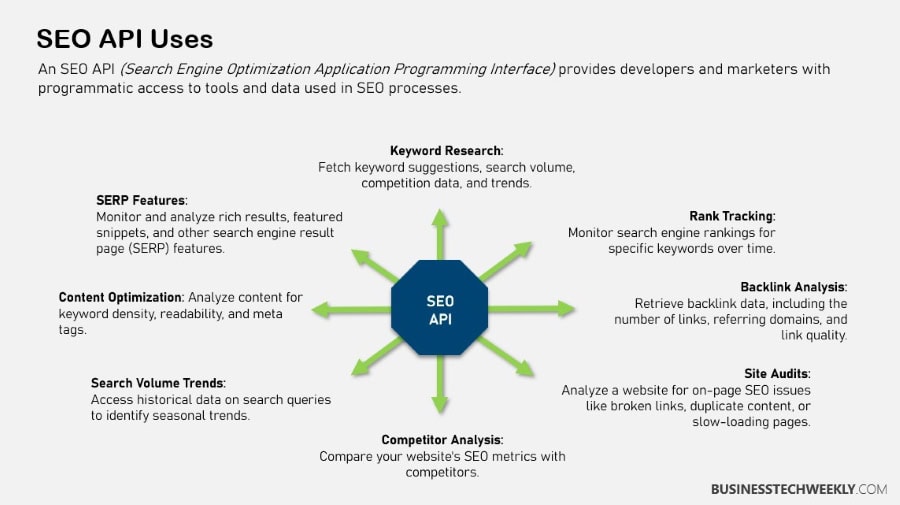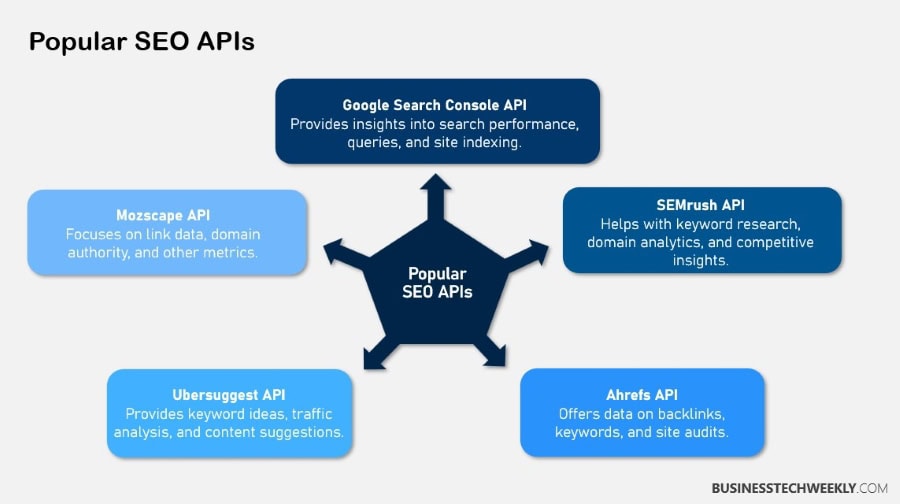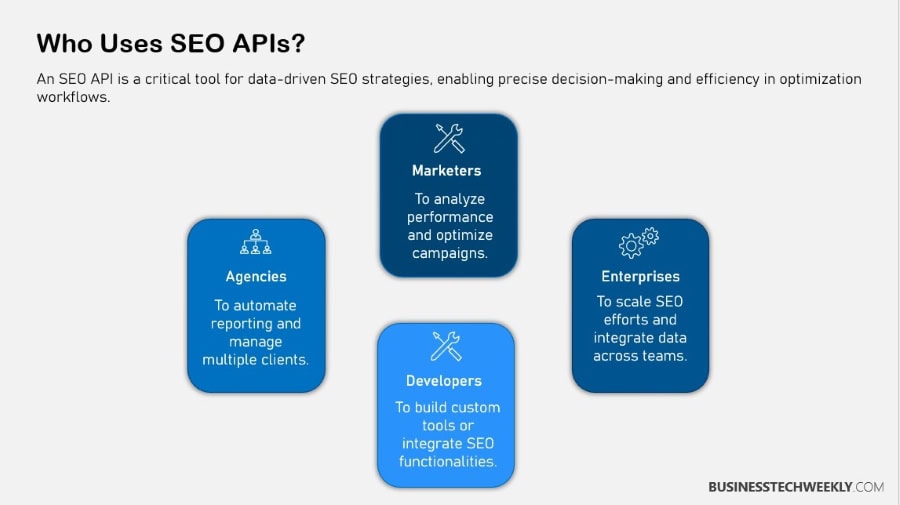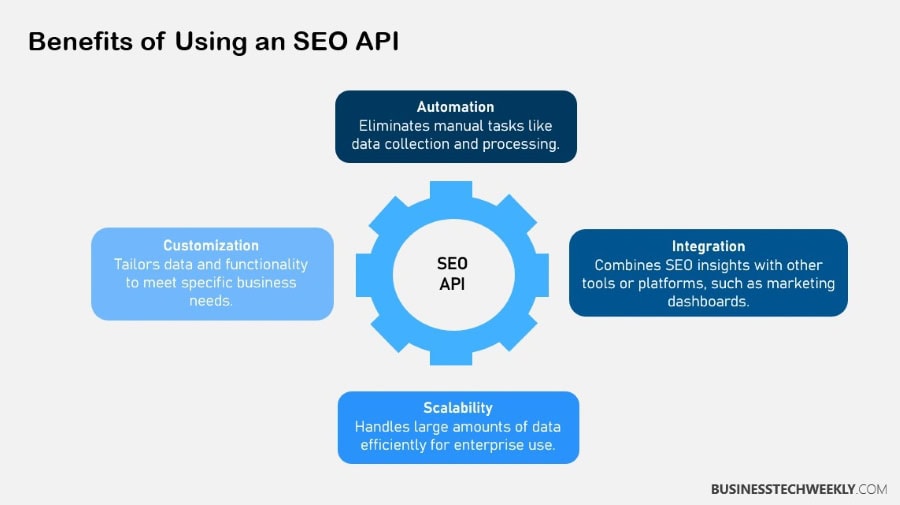SEO APIs – Unlocking Automation and Insights for Marketers

On this page:
What Are SEO APIs
Definition of SEO APIs
SEO APIs, or application programming interfaces, are extremely powerful tools. They allow you to tap into a deep pool of SEO-related data and functionalities.
These APIs are built to retrieve, analyze, and engage with data from search engines and other online platforms.
Technically, SEO APIs work through endpoints — the address of a database on a server that you can send or request data from. The response is most often given in the JSON format.
This text-based lightweight data interchange format is easy for humans to read and write, and easy for machines to parse and generate.
With this technical foundation, developers can create custom applications to meet the unique needs of any marketing effort.
SEO APIs also offer a wealth of structured data that can fuel deep analysis and holistic reporting.
This provides marketers with a powerful tool to better understand their strategies and optimize them effectively.
RELATED: Understanding Application Programming Interfaces (APIs)
Importance of SEO APIs in Marketing
SEO APIs have become a key asset in the marketing industry, delivering accurate, up-to-date search engine data at the speed of business.
This real-time information is invaluable for marketers who want to take data-driven, informed decisions when planning their campaigns.
Having access to that much data, 90 billion pages and 700+ billion unique external links to be precise, is an incredible competitive edge.
This robust data improves market intelligence and fuels data-based decisions.
These APIs make it easier to spot technical issues, such as crawl errors and broken links. This automation allows marketers to focus their efforts on higher-level, more strategic projects.
They empower both technical and creative marketing avenues.
This allows you to discover new long-tail keywords and measure performance metrics such as clicks, impressions, etc.
SEO APIs can be used to address website speed optimization. This update is extremely important for improving a site’s rating in Google’s algorithms and increasing their SERP position.

Benefits of Using SEO APIs
SEO APIs provide a wealth of benefits that can greatly improve your digital marketing strategy.
First, they offer significantly greater data accuracy and speed of access. APIs provide a direct line to the most current data, directly from the source.
That translates to you eliminating the lag time and errors typically associated with manual data collection.
This real-time responsiveness means your strategies will always be informed by the latest insights, providing you with a distinct competitive advantage.
In addition, SEO APIs can significantly minimize repetitive tasks, increasing efficiency across your marketing staff enabling businesses to automate tedious tasks such as data collection and comparison.
This frees up your team to focus on more strategic planning and tap into their creative potential. This change reduces busy work and frees up time for more complex, targeted, and successful campaigns.
This flexibility means you can tailor the tools to meet your unique objectives. In turn, you make sure that each element of your strategy is being fully accounted for.
In terms of cost-effectiveness, SEO APIs beat traditional SEO tools hands-down. While some APIs are completely free, others can run in the hundreds of dollars monthly.
They tend to provide much deeper data and insights than third-party tools can deliver.
This offers them a perfect economical choice for businesses small and large, who are always trying to get the most bang for their buck.
Leading tools, like Semrush, offer API integration. This means you can tap into powerful data to enhance your digital marketing campaigns without incurring massive additional expenses.
Companies utilizing APIs, including SEO APIs, have experienced a 12% higher market capitalization growth compared to non-adopters, highlighting the significant impact of API integration on business performance.
1. Access to SERP Data
SEO APIs give you direct access to search engine results pages (SERPs), allowing for in-depth analysis of your online presence.
Key SERP data points accessible through APIs include:
- Rankings
- Snippets
- Ads
Such data is vital for tracking keyword performance and visibility, helping you understand where your content stands in the competitive landscape.
Examine SERP data to guide your content creation and SEO strategy.
This helps you make sure your pages are appealing and findable by the people you care about most.
2. Keyword Research and Analysis
SEO APIs further improve your capacity to conduct in-depth keyword research and analysis.
Essential keyword metrics provided by APIs include:
- Search volume
- Competition
These metrics are also key in finding long-tail keywords and related queries, which can be crucial in targeting niche markets.
Leverage these insights to inform your content creation.
When you can tailor your SEO strategies to match the interests of your specific audience, you will drive much more relevant traffic to your site.
3. Backlink Tracking and Analysis
When it comes to managing backlinks, SEO APIs provide powerful tools for tracking and analyzing link profiles.
Here’s a comparison table of different backlink metrics available through various APIs:
|
Metric |
Description |
|---|---|
|
Domain Authority |
Measures site’s credibility |
|
Link Types |
Differentiates between link kinds |
SEO APIs make backlink analysis much more efficient, helping you identify opportunities to improve your website’s authority and search rankings.
Third, APIs provide dynamic, ongoing tracking of your backlink profile development over time.
This also gives you the power to react in minutes to changes in your link profile.
4. Competitor Insights and Intelligence
SEO APIs offer a wealth of information on competitor strategies and performance.
Key competitor metrics accessible via APIs include:
- Traffic estimates
- Keyword rankings
This kind of competitive analysis is crucial in surfacing untapped market opportunities and gaps, so you can pivot your marketing strategy and positioning to fill them.
Find out what your competitors are doing right and wrong.
That knowledge will allow you to develop a more intelligent strategy to win more of the market share.
5. Content Creation and Optimization
SEO APIs help you come up with content ideas that align with what people are searching for and talking about.
Content optimization features offered by APIs include:
- Readability scores
- Keyword suggestions
Strategic, data-driven content strategies are essential to capturing the attention of your target audiences and achieving your SEO goals.
APIs also make the process of reviewing content easier by providing actionable insights.
That way, your content resonates with your audience while also ranking well in search results.
6. Domain and Technology Insights
SEO APIs provide visibility into domain performance and technology usage.
Here’s a categorization of different domain metrics available through APIs:
|
Metric |
Description |
|---|---|
|
Page Speed |
Measures load time efficiency |
|
Mobile-Friendliness |
Assesses mobile usability |
Keeping an eye on developing tech trends is vital for improving your site and staying ahead of the curve.
Domain insights drive intelligent, strategic decisions.
They allow you to identify the most impactful improvements to make in order to remain competitive within today’s digital landscape.
SEO APIs enable the automation of data collection and analysis, allowing businesses to manage large volumes of SEO data efficiently. For instance, they can automate tasks such as keyword tracking, backlink analysis, and SERP data retrieval, leading to more accurate and actionable insights for decision-making.
Popular Types of SEO APIs
Come swim in the SEO APIs ocean and learn about all the different types of APIs. These tools work to simplify and improve various facets of search engine optimization.
These APIs are invaluable resources for any SEO professional seeking to streamline their workflow while increasing their online visibility.
Here’s a quick look at some of the most popular types:
- Provide real-time search engine results page (SERP) data.
- Offer insights into backlink profiles and link-building opportunities.
- Deliver comprehensive data on website traffic and user engagement.
Each kind of API offers different capabilities and functionalities that can help you revolutionize your SEO approach.
When leveraging these tools in conjunction with one another, you can develop a powerful, data-driven approach to SEO.
Search Engine Result APIs
One of the most important types of APIs for SEO are SERP APIs, or Search Engine Result Page APIs.
First and foremost, they allow you to monitor keyword rankings.
This insight is invaluable for gauging how your website stacks up against the competition in your highly competitive landscape.
These APIs, which capture Response Times and Data Accuracy are highly optimized for speed and accuracy, delivering critical insights in near-real-time.
These tools can greatly improve your competitive analysis, alerting you when competitors gain (or lose) SERP positions.
SEO APIs can also help you find long-tail keywords that other, more traditional tools won’t be able to find, giving you a competitive edge in your market.
Advertising Platform APIs
Advertising Platform APIs are an important bridge between SEO data and paid marketing efforts.
They provide metrics that are very useful, like ad performance and return on investment (ROI).
These insights are key to maximizing your advertising spend and targeting the right audiences.
- Ad Impressions
- Click-through Rate (CTR)
- Conversion Rate
- Cost per Click (CPC)
By bringing these metrics together, you have a better understanding of how users behave, which will help you create a better, more effective SEO strategy. These APIs remove the grunt work, allowing SEO professionals to focus on more strategic activities.
Content Generation APIs
Content Generation APIs automate the creation of text, images, and videos, producing high-quality content at scale.
They can also write anything from blog content to meta tags.
This allows you to produce a healthy content pipeline without sacrificing quality.
- Product Descriptions
- Meta Tags and Descriptions
- Social Media Content
These APIs maximize the time content creators have in their day, letting them dedicate more hours to creative initiatives.
They help make sure your content stays fresh and exciting, something that’s critical to avoiding an outdated SEO strategy.
Domain and App Data APIs
The Domain and App Data APIs are great for understanding how websites and applications are performing.
Uptime and User Engagement metrics let you monitor domain health and user engagement efficiently.
This kind of data is key to finding SEO success and perfecting mobile initiatives.
Keeping a close eye on these important metrics will keep your website competitive and user-focused.
App data APIs provide useful information about app performance, allowing you to better customize efforts for the mobile audience.

How to Utilize SEO APIs Effectively
Integrate APIs into Marketing Workflows
Building SEO APIs into your marketing stack can be a huge differentiator, providing a seamless process to tackle the work ahead.
By integrating this data, you’re able to adopt a more comprehensive view of your marketing efforts, giving you a better idea of what’s going on.
You can use user-friendly middleware solutions or plan for direct API calls to embed these tools within your current systems.
This level of seamless integration means your team can immediately leverage real-time data, which is key to making the most informed decisions in time-sensitive situations.
Their well-integrated APIs foster collaboration among all marketing teams. By having everyone working from the same, most current information available, they are able to collaborate much better with each other.
This ensures a comprehensive approach.
We’re now all on the same page with our marketing goals, leading to smarter campaigns.
- Use middleware for API integration
- Opt for direct API calls
- Ensure real-time data access
- Enhance team collaboration
Use APIs for Enhancing Website Performance
SEO APIs help you find technical problems hurting your site’s performance. Technical problems can be a huge obstacle to your site’s success.
You can also keep track of important performance metrics like load time and 404 rates.
This information is essential to ensure a high quality user experience. By taking advantage of these findings you too can boost your website’s SEO performance and enhance user experience.
APIs also enable you to continuously monitor and optimize performance, keeping your site ahead of the competition and in tune with evolving user expectations.
- Monitor load times
- Track error rates
- Improve user experience
- Enhance SEO rankings
Leverage Free SEO Tool APIs
For marketers with limited budgets, free SEO tool APIs provide an accessible avenue to leverage SEO without breaking the bank.
These tools have filled a significant gap, providing the insights that allow small businesses to make more informed decisions.
While free APIs may have limitations compared to paid versions, they still offer valuable data that can support your marketing objectives.
Select APIs that best fit your objectives and provide the critical data you require to drive success.
- Access essential insights
- Suitable for small businesses
- Mindful of data limitations
- Align with marketing goals

Getting Started with Free SEO APIs
Getting started with APIs and accessing them can be a bit daunting. Once you get started, though, you unlock their full potential.
To get started, you need to get an API key, which serves as your unique identifier, allowing you access to the API’s resources.
Most providers offer comprehensive documentation, akin to Google Search Central’s guide, detailing how to integrate their APIs into your systems.
Explore this world of knowledge to learn to extract data and create powerful reports. In this first walkthrough, you’ll be browsing endpoints.
These specialized keyword and backlink functions within the API allow you to easily do tasks such as retrieve keyword rankings and dive into backlink analysis.
Guide to Free SEO Tool APIs
Unlocking the power of free SEO tool APIs means knowing what to look for to find the best features for your needs.
Look for functionalities such as data retrieval for keywords and backlinks, reporting capabilities for traffic analysis, and user-friendly interfaces for ease of use.
These powerful features work to supercharge your SEO efforts. They provide rich context around how your content is performing and identify the areas where you can improve.
Test for effectiveness by checking the API’s response time and the accuracy of its data.
Your marketing use cases are going to evolve. As you start using these, consider moving up to premium APIs to take advantage of more advanced features and higher data limits.
Key Considerations for API Use
As you select and implement SEO APIs, there are a few key considerations to keep in mind. The precision of the data they make available is paramount.
Further, the API’s response speed and support quality are also key factors to weigh.
Here are some essential points to ponder:
- Data accuracy: Ensures reliable insights
- Response time: Affects user experience
- Support: Offers assistance in resolving issues
Following usage policies and legal requirements is important to stay out of trouble, including penalties for duplicate content.
When you account for these factors, you can start to use the API with confidence.
This approach will help make sure that it fits naturally into your SEO strategy.
Comparing Free and Paid APIs
By knowing the differences between free and paid SEO APIs, you can ideally select the option that’s best for you.
Free APIs are a great place to start, but when your data needs expand, you’ll need to upgrade. Paid options come with more advanced features and support.
They also offer deeper data access, which makes them ideal for businesses with their eyes set on scalability.
When to Upgrade Your API
Signs include increased data needs, limitations in current functionalities, and a desire for enhanced features.
The advantages of moving up are huge, with better performance, support, and scalability awaiting you.
Position your API functionality to support your growing business model. This kind of alignment not only helps you stay competitive, it helps you better accomplish your SEO goals.

Actionable Tips for API Integration
Including APIs in your marketing strategy can be a total game changer. It’s a powerful tool that lets you easily connect third-party platforms and services and extend the functionality of your website.
Here are some actionable tips to help you integrate APIs successfully and get the most bang for your buck with this powerful technology.
First, know what you want to accomplish. Having a clear idea of what you’re hoping to accomplish with API integration is key.
You may want to improve the user experience, better analyze your data, or make content creation easier.
After you define your goals, develop a testing strategy to test the integration, so it works seamlessly without unexpected issues.
- Objectives: Clarify what you aim to achieve with the integration.
- Test Integrations: Ensure smooth operation before going live.
- Monitor Continuously: Regularly check performance and optimize usage.
The key is to continuously monitor and optimize your API usage over time. This means monitoring performance metrics to make sure that the APIs are performing according to expectations.
When done correctly, integration should yield measurable increases in organic performance.
APIs allow you to automate data exchanges at lightning speed.
You can also scrape SEO keywords with location-based intelligence, providing you a leg up on your competitors in search rankings.
Implement APIs for Measurable Results
Establishing metrics is important in order to evaluate how API integration is impacting your SEO work.
Establish KPIs that are in line with your objectives.
These might be measures such as increased traffic, improvements in organic search rankings, and enhanced user engagement.
With regular reporting and analysis, you’ll be able to determine how effective your APIs are at achieving your goals, and make the necessary adjustments to your approach.
- Traffic Growth: Monitor website visitor increases.
- Ranking Changes: Track search engine ranking shifts.
- User Engagement: Evaluate interaction improvements.
These measurable results can greatly help future marketing initiatives, steering changes and improvements based on real data.
Optimize Marketing Strategies with APIs
APIs are a powerful tool that can improve almost every facet of your marketing campaigns, including content creation to data analysis.
By integrating APIs, you enable agile marketing practices that allow for quick adjustments in your campaigns based on real-time data.
That level of flexibility underlies higher ROI and a more engaging, customer-friendly experience.
- Campaign Tracking: Streamline the monitoring of marketing campaigns.
- Audience Insights: Gain deeper understanding of your customer base.
Optimized strategies through APIs set you up to be more responsive and effective in your marketing efforts.
Maximize Budget with Free Tools
By leveraging free SEO tools and APIs, you can achieve your marketing goals while staying well within your budget.
Prioritizing only the most essential features and leveraging resources in the community can be a more cost-effective approach.
We love free tools, and they can be incredibly effective. Filling in the gaps with paid options unlocks powerful features at your disposal when you want them most.
- Essential Features: Focus on what truly impacts your goals.
- Community Resources: Utilize shared knowledge and tools.
When you maximize the efficiency of your budget, you pave the way for sustainable growth, giving you the room to invest in other areas of your business intelligently.
Key Takeaways
SEO APIs unlock a plethora of opportunities to enhance your overall digital strategy.
Real-time access to data SEO APIs let you tap into the best, most accurate data and insights available.
They allow you to measure results, discover new opportunities, and create better content. By automating complex data processes, they give you more time for deeper, more strategic tasks, driving more impactful SEO results.
- SEO APIs are indispensable and invaluable tools for marketers. They give you access to powerful SEO-related data and functionalities, allowing you to automate tasks and deliver real-time insights for greater efficiencies.
- These SERP APIs help you pull, filter, and aggregate data from search engines. They utilize API endpoints and data formats such as JSON – allowing developers to design custom applications that enhance and optimize marketing efforts.
- SEO APIs provide you with access to high quality, real-time data. This data provides you the power to make intelligent, data-backed decisions to provide you a leg up on competitors in market analysis, and to feed multiple marketing channels.
- These tools provide better data accuracy, faster access to data, less manual effort, and higher productivity. They’re immensely customizable, fitting into almost any marketing strategy and objective, and they’re more budget-friendly than most legacy SEO platforms.
- What types of SEO APIs are there SEO APIs can be found in various forms including SERP APIs, backlink checker APIs, and analytics APIs. Each one provides distinct features that, when combined, can create a holistic SEO strategy.
- Incorporate SEO APIs into your marketing tech stack to unleash their full potential. Prioritize ongoing testing and iteration and ensure their use flows through and aligns with your broader marketing goals to get more out of your data and create more impactful insights.
Frequently Asked Questions
What are the benefits of using SEO APIs?
SEO APIs help teams work more efficiently by automating data collection and analysis processes.
They deliver the most precise, up-to-the-minute information, allowing for smarter, more data-driven decisions.
When you connect SEO data to the rest of your systems, you save time and work smarter for growth.
What are the popular types of SEO APIs?
Some of the most popular SEO APIs are keyword research APIs, rank tracking APIs, backlink analysis APIs, and site audit APIs.
Each one plays a distinct role, providing powerful, technical intelligence to maximize the impact of your SEO efforts.
How can I utilize SEO APIs effectively?
To get the most out of SEO APIs, incorporate them into the systems you already use to automate data collection and analysis.
Apply these findings to your SEO strategy to make data-driven decisions that improve your online presence.
How do I get started with free SEO APIs?
Begin your journey by delving into free SEO APIs, which are often available from major providers such as Google, Moz, or SEMrush.
Subscribe to their services, consume their documentation, and start integrating them into your WAN to see if they add value.
What are some actionable tips for API integration?
Check that your development or implementation environment is appropriate for the API.
Follow the documentation to the letter, test your integration in a staging environment, and keep a watchful eye on performance.
Test your integration regularly to catch and address API changes.

